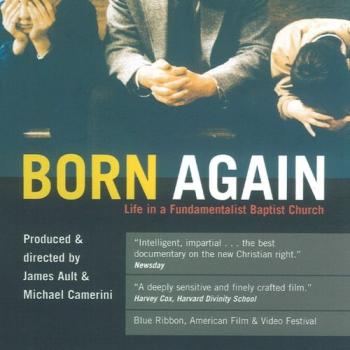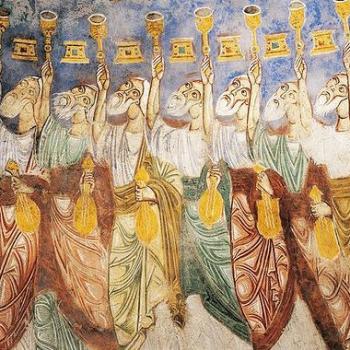Who Is the Most Influential American Theologian?
I apologize for the picture; I cannot find a pic of him that is in public domain. If you don’t know what he looks like, go to “Google Images” or his web site or Youtube.
Drum roll…..The most influential American theologian is…John Piper.
And he is extremely influential in Brazil and other countries outside the U.S.
Never heard of him? Well, that probably means you’re not a hip Christian.
Piper is often overlooked by academics because he has spent most of his life and career as a pastor and writer of relatively popular books of conservative Protestant Christianity. He is often unknown to people over 50–even in strongly evangelical churches. However, his influence, often through surrogates, mostly younger pastors who also write books, speak at huge youth conventions, and have podcasts watched by many thousands of younger Christians, has been enormous among those academic theologians would probably dismiss as “the great unwashed.”
Piper has written numerous books that have sold hundreds of thousands of copies—many in translations outside the U.S. He is the main attraction at Christian youth conferences that attract upwards of fifty thousand every year.
But is he a “theologian?” Absolutely—even if most of his books are popular in terms of the intended audience. Piper graduated from Wheaton College, Fuller Theological Seminary, and holds a doctoral degree in New Testament from the University of Munich (Germany). But he has chosen to focus his energy and attention on ordinary Christians—not other scholars.
I attribute the rise of the “new Calvinism” (popularly dubbed the “Young, Restless, Reformed Movement”) to him although many of its spokesmen and leaders are his acolytes. I do not believe that movement would have begun or “taken off” without Piper as its catalyst (through his pastors conferences and through his speaking at Passion Conferences and through his books and podcasts).
Piper is, to use a poor figure of speech (for a Christian), a force of nature. (Of course his followers especially would consider him a “force of God.”) He is extremely knowledgeable, highly educated, winsome, and articulate. I find it difficult to compare him with anyone—in terms of his unique combination of scholarship and popular appeal.
Personally, I think Piper deserves to be on the cover of Time magazine—if Time still published (as in the past) cover stories about influential people. But somehow, for some reason, his influence and his huge following has mostly flown under the radar—except among conservative evangelical Christians under 40 or 50.
Over the past twenty five to thirty years I have been asked about Piper more than about any other single individual.
I have met Piper twice and corresponded with him by e-mail numerous times (but not recently). I first met him in about 1982 at the college where he taught New Testament and where I hoped to teach theology. He left that college to become a pastor about a year before I joined its faculty. But the whole fifteen years I was on its faculty I heard Piper’s name mentioned in all kinds of ways almost every day. During the 1980s and 1990s many of my students were dubbed “Piper Cubs” because of their ardent appreciation for “Pastor John.”
In 1999 I left that college largely because of “Pastor John’s” influence there. He and I had a one-on-one meeting over lunch (for two hours) that was, to say the least, not encouraging for my future in that institution. But I have told that story here before and will let it go now.
Since 1999 I have taught at another, somewhat similar, evangelical Baptist institution and heard Piper’s name literally hundreds, maybe thousands, of times—from all kinds of people. I have read many of his books and shown many of his Youtube clips and clips of his podcasts to classes. Even when I strongly disagree with him I have to admit that he is knowledgeable, passionate, and extremely articulate.
One thing I like very much about Piper is that he does not shrink back from embracing the logical conclusions of his strongly held beliefs. In other words, unlike many other very conservative, Calvinist, complementarian theologians and pastors he does not “fudge” even if he does occasionally appeal to what he calls “mystery” and I would call “contradiction.”
What is the key to understanding Piper—in terms of his basic theological underpinnings? After all, as I have said here before, one reason I took up historical theology as my main interest is that I suspect there are no new ideas in Christianity. Piper “channels” Jonathan Edwards which is not to say he agrees with every single thing Edwards wrote or did. And, of course, Piper says things Edwards did not say—especially about contemporary American culture and Christianity.
If “influence” is defined in terms of popular impact on the masses, as opposed to on academics, Piper deserves to be called the single most influential American theologian of the past quarter of a century. And the amazing thing (to me) is how most academic theologians fail to recognize or acknowledge this fact.
Note: I do not speak here for anyone but myself. If you choose to respond, make sure your response is civil and respectful and makes a contribution to a conversation among diverse people about the subject of the blog essay. This is not a discussion board; there is no “right” to comment here. I moderate comments and discussion and reserve the right to delete any comment that is not civil. Please keep comments brief and DO NOT include any hyperlinks or pictures.
















